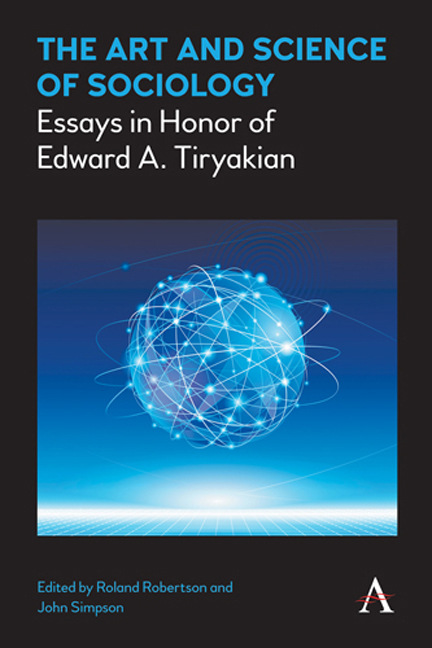Book contents
- Frontmatter
- Contents
- List of Figures and Tables
- List of Contributors
- Acknowledgments
- Introduction
- Chapter 1 The Dynamo and the Diplomat: Tiryakian's Role in Preserving Sorokin's Reputation
- Chapter 2 Edward Tiryakian and Modernization Theory: A Very Special Relationship
- Chapter 3 Developmental Path (Entwicklungsform): A Neglected Weberian Concept and Its Usefulness in the Civilizational Analysis of Islam
- Chapter 4 The Existential Sociology of Edward Tiryakian: Toward an Integrated Paradigm
- Chapter 5 Comparative Reflections on Sociology and Conservatism: The Contributions of Edward A. Tiryakian
- Chapter 6 Contemporary Changes in the Processes of Social Differentiation: Toward an Analytical Version of the Theory
- Chapter 7 Considerations on Global Studies
- Chapter 8 Honoring Edward Tiryakian as a Metasociologist: A Metaconceptual Analysis of Prosumption and Related Concepts
- Chapter 9 Dangerous Nouns of Process: Differentiation, Rationalization, Modernization
- Chapter 10 Modernization as Social Becoming: Ten Theses on Modernization
- Chapter 11 Religion and Evolution
- Chapter 12 The “Axial Age” vs. Weber's Comparative Sociology of the World Religions
- Edward A. Tiryakian's Publications
- Index
Chapter 2 - Edward Tiryakian and Modernization Theory: A Very Special Relationship
Published online by Cambridge University Press: 22 July 2017
- Frontmatter
- Contents
- List of Figures and Tables
- List of Contributors
- Acknowledgments
- Introduction
- Chapter 1 The Dynamo and the Diplomat: Tiryakian's Role in Preserving Sorokin's Reputation
- Chapter 2 Edward Tiryakian and Modernization Theory: A Very Special Relationship
- Chapter 3 Developmental Path (Entwicklungsform): A Neglected Weberian Concept and Its Usefulness in the Civilizational Analysis of Islam
- Chapter 4 The Existential Sociology of Edward Tiryakian: Toward an Integrated Paradigm
- Chapter 5 Comparative Reflections on Sociology and Conservatism: The Contributions of Edward A. Tiryakian
- Chapter 6 Contemporary Changes in the Processes of Social Differentiation: Toward an Analytical Version of the Theory
- Chapter 7 Considerations on Global Studies
- Chapter 8 Honoring Edward Tiryakian as a Metasociologist: A Metaconceptual Analysis of Prosumption and Related Concepts
- Chapter 9 Dangerous Nouns of Process: Differentiation, Rationalization, Modernization
- Chapter 10 Modernization as Social Becoming: Ten Theses on Modernization
- Chapter 11 Religion and Evolution
- Chapter 12 The “Axial Age” vs. Weber's Comparative Sociology of the World Religions
- Edward A. Tiryakian's Publications
- Index
Summary
Anyone familiar with developments in the field of social theory during the last two or three decades should not have much difficulty in coming to terms with the contributions of Edward A. Tiryakian. In addition to the fact that his style of writing is as elegant as his arguments are precise, he obviously never leaves his readers in the dark with respect to which theoretical camp he belongs. Tiryakian was one of the first authors who theorized the geopolitical sea change after 1989, claiming that many of the assumptions upon which dependency theorists—such as the early Fernando Henrique Cardoso or world systems analysts such as Immanuel Wallerstein—had built their arguments, have turned out to be false so that there is time for rethinking macrosociology. Frequently quoting Talcott Parsons's work, Tiryakian seemed to have argued that, despite some major problems, the basic structure of classical modernization theory as developed in the 1950s and 1960s is not completely defunct and thus could be transformed in a fruitful way, leading to a new theoretical paradigm, which he suggested calling “‘Modernisation II’, or alternatively, ‘Neo-Modernisation Analysis’” (Tiryakian 1991: 171–72).
In his attempt to restructure modernization theory Tiryakian was certainly not alone; he had quite a few companions all over the world, from Jeffrey Alexander and Paul Colomy in the United States to Piotr Sztompka in Poland or Wolfgang Zapf in Germany, all of whom tried to continue and to renew either the Parsonian legacy or the modernization approach and, by doing so, to come to a new and more fruitful understanding of social change (Alexander 1998; Sztompka 1993; Zapf 1991). And although it is not too difficult to find at least some differences between Tiryakian's endeavor on the one hand and the attempts of his colleagues just mentioned on the other, this should not prevent one from categorizing Tiryakian in terms of social theory: He is no Marxist, to be sure, no Postmodernist, no Critical Theorist and no follower of radical systems analysis a la Niklas Luhmann.
- Type
- Chapter
- Information
- The Art and Science of SociologyEssays in Honor of Edward A. Tiryakian, pp. 23 - 42Publisher: Anthem PressPrint publication year: 2016

